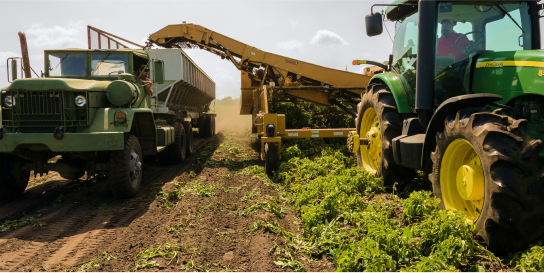Sustainable agriculture has emerged as a crucial concept in recent years as the world grapples with the challenges of feeding a growing population while preserving the planet’s resources. This paradigm shift in farming practices has gained significant traction due to its potential to address pressing environmental concerns and ensure long-term food security.
As investors, it is vital to recognize the importance of sustainable agriculture for its positive impact on society and as a lucrative opportunity.
Why is Sustainable Farming Important?
Investing in sustainable agriculture is not just a responsible choice but also a smart one for today’s investors. As climate change accelerates and the global population continues to rise, the importance of sustainable farming practices becomes increasingly evident.
Sustainable agriculture offers a comprehensive approach addressing environmental, social, and economic factors, providing long-term benefits for farmers and investors.
How Does Sustainable Agriculture Help the Environment?
Sustainable agriculture plays a vital role in mitigating the adverse effects of climate change on the environment. By employing climate-smart solutions, such as precision farming techniques and advanced irrigation systems, farmers can optimize resource utilization and reduce the carbon footprint associated with food production.
Additionally, sustainable farming practices focus on soil conservation, minimizing erosion, and enhancing soil health through crop rotation, cover cropping, and organic fertilization. These methods protect the land’s natural biodiversity, prevent water contamination, and preserve vital ecosystems.
Benefits of Sustainable Farming
Investing in sustainable agriculture offers numerous benefits for both the environment and investors. Let’s explore some of these sustainable farming benefits:
- Climate Resilience: Sustainable farming practices increase the resilience of agricultural systems in the face of climate change. By implementing climate data solutions and utilizing advanced technologies, farmers can adapt their practices to changing weather patterns, reducing vulnerability to droughts, floods, and extreme temperatures.
- Preserving Natural Resources: Sustainable agriculture promotes the efficient use of resources, such as water and energy, minimizing waste and environmental degradation. Farmers can reduce their dependence on fossil fuels and decrease water usage by employing precision irrigation techniques and renewable energy sources, resulting in substantial cost savings and environmental benefits.
- Improved Soil Health: Sustainable farming practices prioritize soil conservation and regeneration. Farmers can enhance soil fertility, promote biodiversity, and reduce soil erosion by implementing crop rotation, agroforestry, and organic fertilization. Healthy soils improve crop yields and sequester carbon, mitigating climate change.
- Protecting Biodiversity: Sustainable agriculture aims to maintain and restore biodiversity in farming landscapes. By preserving natural habitats, incorporating diverse crop rotations, and avoiding harmful pesticides, farmers contribute to preserving essential pollinators, insects, and wildlife. This ecological balance is crucial for maintaining healthy ecosystems and resilient food production systems.
Goals of Sustainable Agriculture
Sustainable agriculture encompasses various goals that align with the principles of environmental stewardship and economic viability. Some of the primary objectives include:
- Enhancing Food Security: Sustainable farming practices focus on producing nutritious and abundant food while minimizing the ecological impact. Farmers can increase productivity, adapt to changing climatic conditions, and ensure a stable food supply for future generations by implementing resilient farming techniques.
- Reducing Greenhouse Gas Emissions: Sustainable agriculture aims to reduce greenhouse gas emissions associated with food production. This can be achieved through carbon sequestration in soils, adopting renewable energy sources, and reducing synthetic fertilizers and agrochemicals.
- Promoting Economic Viability: Sustainable agriculture offers economic benefits by diversifying income sources for farmers and reducing production costs in the long run. By implementing sustainable practices, farmers can access premium markets, reduce input expenses, and mitigate financial risks associated with climate variability.
- Fostering Social Equity: Sustainable agriculture encourages fair labor practices, promotes rural development, and supports the well-being of farming communities. By investing in sustainable farming, investors can contribute to creating a more equitable and resilient food system.
Investing in sustainable agriculture is a responsible choice for our planet’s future and a promising opportunity for investors. By supporting climate-smart solutions and sustainable farming practices, investors can actively contribute to the well-being of the environment, society, and their financial portfolios.
Conclusion:
The importance of sustainable agriculture cannot be overstated, especially in the face of climate change and a growing global population. Sustainable farming practices provide a holistic approach that benefits the environment, enhances food security, reduces greenhouse gas emissions, and fosters economic viability. By investing in sustainable agriculture and embracing climate data solutions, investors can actively participate in building a resilient and sustainable future for all.

